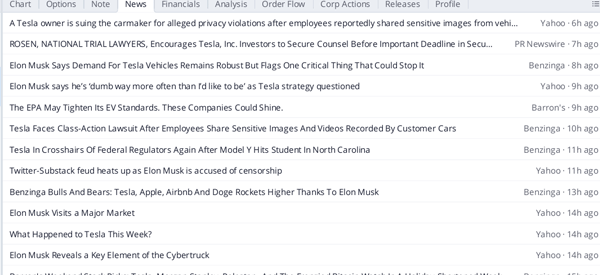Information Overload Wrecks Your Analysis. How to Handle It?

Information overload refers to a situation where a trader or investor has access to too much information about a financial asset or the broader market.
These days, the situation of an information overload has become worse because of the large number of websites covering the financial market (and the large influence of social media).
In this article, we will explain what is information overload and why it matters.
Information overload definition
The first thing you will ask is 'what is information overload?' Information is an important part of the financial market. It helps traders know whether to buy or sell a financial asset. Similarly, information helps investors know more about assets and why they are rising or falling.
In the past, the amount of information in the market was a bit limited. At the time, people relied on traditional media companies like the New York Times and Wall Street Journal (WSJ). Today, the number of resources covering the financial market has increased dramatically. Any person can create a website and publish this information.
Therefore, information overload is a situation where you have access to too much information about one or more financial assets. For example, ten analysts can deliver ratings of a certain company per day. As a trader, you can struggle to differentiate these ratings and know the ones to follow.
Information overload is not limited to news. It is also found in educational content in the market.
Today, there are thousands of financial educational websites. For example, you will find different writers and video creators explain how to use a technical indicator differently. Some recommend buying an asset when it gets overbought while others recommend shorting it.
Example of information overload
A good example of information overload is when you look for a popular company like Tesla. The screenshot below shows that tens of articles about Tesla have been written in the past 24 hours.
In some periods, the amount of this information is usually more than that.

Therefore, while this information is good, it can confuse a day trader or even an investor.
Causes of information overload
There are three main causes of information overload in the financial market. The first cause is quantity, where the number of information sources are too much.
Some of these popular sources that people use in the industry are
- Bloomberg
- Wall Street Journal
- Financial Times
- Fool
- Benzinga
- MarketWatch
- Barron’s
among others. The fact that there are too many news sources is the main reason for this. This also applies to educational content as well.
Social media
Second, the other cause of information overload is the rise of social media tools like Twitter, StockTwits, and Reddit. Many beginner traders rely on tips from these platforms.
At times, while this can work well, the reality is that too much information from social media platforms can confuse you.
Overdoing
The other cause of information overload is when you try to do too much at once. This happens when you are trying to juggle too much at once.
This situation will see you being overloaded by too much information in the market.
Rhythm of transmissions
Further, the speed of information transmission is also a cause of information overload. This is a situation where information is moving at a faster pace than usual.
Today, because of the internet, information moves at the fastest pace ever. When the Fed publishes its interest rate decision, you will find too much information a few minutes later.
How to deal with information overload
Therefore, the question is how you should deal with information overload as an investor or trader. Some of the top steps you can decide to use are:
Prioritize what is important
The first, and probably the most important way to deal with information overload is to prioritize what is important. For example, you can prioritize the best sources of news in the market.
Some of the top news sources that you can use in trading are Bloomberg, Financial Times, and WSJ. While these platforms are not always accurate, they tend to provide accurate information.
The same is true with social media platforms. In this case, you can prioritize following the most credible people in the industry.
Focus on one task at a time
The other way to deal with information overload in trading is to focus on one task at a time. For example, you can decide to only trade a maximum of five assets per day.
This can be companies like Apple, ExxonMobil, JP Morgan, UnitedHealth, and Pfizer. By focusing on a small number of companies, you will avoid a situation where you have too much confusing information at a time. The opposite of overtrading.
Take breaks
Another way of dealing with information overload is to take regular breaks in the trading session.
Instead of trading for more than 10 hours per day straight, you can decide to take several breaks in between. Taking these breaks will give you an opportunity to reset.
Be selective on the news sources you use
Further, you should be selective on the news sources that you use in trading. This means that you should narrow your focus on a select number of sites. At times, you will find that less is more in this regard.
It's good to try to get more information about the asset we have decided to trade, but we should not overdo it. For example, a scalper or day trader can do without knowing all the fundamental info of a company.
Time limit for consuming information
Finally, you should create a time limit for consuming information in the market. This means that you can decide to spend a few minutes every day processing this information.
Other simple ways for avoiding information overload are having a watchlist, use an automated software to filter data, and have a well-developed plan.
Consequences of information overload
There are several key consequences of information overload in the market. Some of the most consequences are:
- Poor performance - In most cases, information overload will lead to poor performance in the market.
- Burnout - At times, information overload can lead to burnout, which will in turn lead to stress and depression.
- Analysis paralysis - This is a situation where you struggle to make decisions because of having too much information.
- Recency bias - This is defined as a situation where you make decisions based on the last recent information that you made.
Summary
This article has looked at an important concept that many traders go through every day. Information overload can have serious implications and lead to losses and other effects like stress and depression.
We have also looked at some of the best ways to avoid this type of information overload in the financial market.
External useful resources
- How to Save Yourself From “Information Overload” - Harvard Business Review



